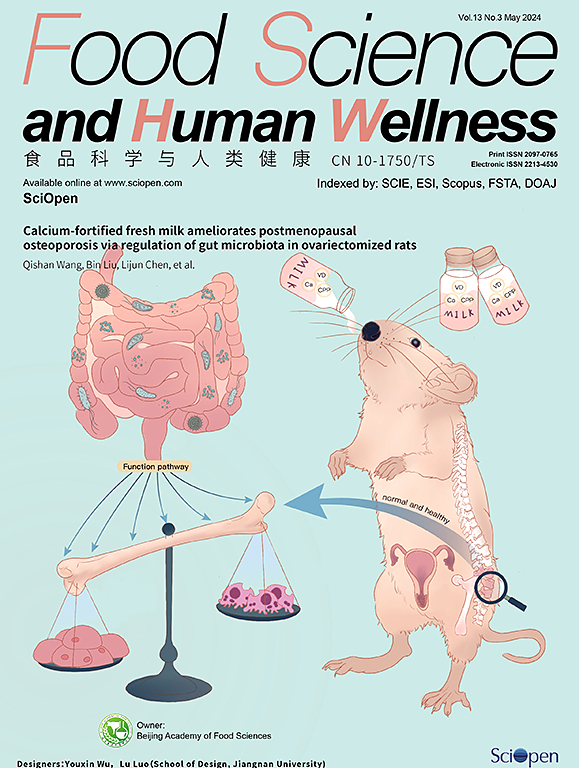Diet restriction and exercise alleviate cognitive reduction of high fat diet (HFD)-induced obese mice by rescuing inflammation-mediated compromised insulin signaling pathway through activating AMPK/SIRT1 signal pathway and suppressing TLR4 signal pathway
IF 7.4
1区 农林科学
Q1 FOOD SCIENCE & TECHNOLOGY
引用次数: 0
Abstract
Obesity, caused by excessive energy, leads to body weight gain and various diseases, including cognitive impairment. Current studies suggest that diet restriction such as optimal fasting and regular exercise are crucial for improving cognitive capacity. However, further exploration is needed to understand the specific mechanisms of high fat diet (HFD)-induced cognitive decline in obesity. In the present study, 4-month-old mice were subjected to HFD feeding for 18 weeks, followed by aerobic exercise and high-intensity intermittent exercise, regular diet feeding, and intermittent fasting for 8 weeks, and then used to evaluate cognitive capacity, inflammation, compromised insulin signaling pathway, and apoptosis in hippocampal tissue, as well as AMPK/SIRT1 and TLR4 signal pathways. Obese mice revealed impaired cognitive capacity as compared with mice fed with regular diets. In contrast, aerobic exercise, high-intensity intermittent exercise, regular diet, and intermittent fasting could inhibit apoptosis caused by inflammation-mediated compromised insulin signaling pathway in hippocampal tissues through activating the AMPK/SIRT1 signal pathway and suppressing the TLR4 signal pathway, thereby rescuing the cognitive impairment of obese mice. Therefore, diet restriction and exercise interventions may play a positive role in reverting obesity-induced cognitive impairment.
通过激活 AMPK/SIRT1 信号通路和抑制 TLR4 信号通路,挽救炎症介导的胰岛素信号通路受损,从而限制饮食和加强运动,缓解高脂饮食(HFD)诱导的肥胖小鼠认知能力下降的问题
肥胖是由过度的能量引起的,会导致体重增加和各种疾病,包括认知障碍。目前的研究表明,饮食限制,如最佳禁食和定期锻炼,对提高认知能力至关重要。然而,高脂肪饮食(HFD)导致肥胖认知能力下降的具体机制需要进一步探索。在本研究中,4月龄小鼠进行HFD喂养18周,随后进行有氧运动和高强度间歇性运动,定期饮食喂养,间歇性禁食8周,然后用于评估海马组织的认知能力,炎症,胰岛素信号通路受损,凋亡以及AMPK/SIRT1和TLR4信号通路。与正常饮食的小鼠相比,肥胖小鼠的认知能力受损。相反,有氧运动、高强度间歇运动、规律饮食和间歇性禁食可以通过激活AMPK/SIRT1信号通路和抑制TLR4信号通路,抑制炎症介导的海马组织胰岛素信号通路受损引起的细胞凋亡,从而挽救肥胖小鼠的认知功能障碍。因此,饮食限制和运动干预可能在恢复肥胖引起的认知障碍中发挥积极作用。
本文章由计算机程序翻译,如有差异,请以英文原文为准。
求助全文
约1分钟内获得全文
求助全文
来源期刊

Food Science and Human Wellness
Agricultural and Biological Sciences-Food Science
CiteScore
8.30
自引率
5.70%
发文量
80
审稿时长
28 days
期刊介绍:
Food Science and Human Wellness is an international peer-reviewed journal that provides a forum for the dissemination of the latest scientific results in food science, nutriology, immunology and cross-field research. Articles must present information that is novel, has high impact and interest, and is of high scientific quality. By their effort, it has been developed to promote the public awareness on diet, advocate healthy diet, reduce the harm caused by unreasonable dietary habit, and directs healthy food development for food industrial producers.
 求助内容:
求助内容: 应助结果提醒方式:
应助结果提醒方式:


